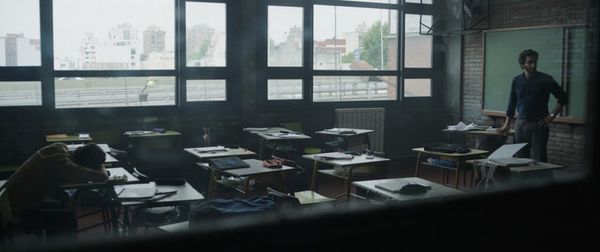Eye For Film >> Movies >> The Substitute (2022) Film Review
The Substitute
Reviewed by: Jennie Kermode

A highly educated middle class teacher moves to a poor area and transforms the lives of his pupils. It’s a saviour fantasy which crops up quite a bit in cinema, and although it can be nicely done, one might reasonably think that there’s not much mileage left in it story-wise. Here Diego Lerman does something quite different, however, by shifting the focus from the impact on the kids to the changes taking place in the teacher himself.
A former university lecturer, Lucio (Juan Minujín) is recently divorced, trying to patch things up with his daughter, settling into a new home and navigating a complicated relationship with his father, the activist and local hero known as El Chileno (Alfredo Castro). It’s because of his father that the kids in his new class are willing to pay him some attention, but that doesn’t amount to much, at least to begin with. His usual tricks for trying to engage with students fall flat. These young people simply don’t see the point in learning anything when they figure that they have no prospects. When Lucio takes a leap and decides to risk his own safety by getting more involved with one of them, he is plunged into a world of criminality and gang control which makes him feel even more helpless – but might at last enable him to find some meaning in his own life.

Lerman paints a detailed picture of life in this troubled area, where a battle over who will become the next mayor is adding to the tension, and the naïve students find themselves exposed to propaganda on top of everything else. A drug raid on the school by armed police might feel like the last straw, but is in fact just the start of an ongoing occupation of sorts which makes teaching even more difficult. Lerman has points to make about corruption and the lax application of laws intended to protect students, His young cast come from similar backgrounds themselves, adding to the sense of authenticity, though several are now going on to try to build careers in the film industry, their real lives changed as Lucio endeavours to change those of their fictional counterparts.
As male characters struggle to escape and yet simultaneously live up to the legacy of their fathers, Lucio seeks to find a different way of expressing his masculinity, empowering others rather than engaging in direct confrontation. It’s a difficult path to walk in a macho culture. Meanwhile, he needs to accept that his daughter is also trying to find a path of her own.
Despite the presence of all these different narrative threads and assorted thriller elements, it’s Lerman’s shooting style which makes the biggest impression. He often shoots through glass, layering reflections with the action behind the school’s internal windows. There are almost always multiple things going on, contributing to the sense of chaos often present even in middle class schools. By contrast, the film’s quiet moments really stand out, demanding a different kind of attention. Particularly arresting is the use of Steadicam, which really seems to have a purpose here, and to be more than just a convenience. Whether we’re tracking through buildings or gently tipping down and then up again as boxes are lifted, it keeps us in the moment, our relationship to the characters visceral and intimate.
At the centre of it all, Minujín gives a performance which is patient and unshowy, gradually letting his character unfold and grow. The result is involving at an unconscious level, drawing viewers in over time. The pacing isn’t perfect and the ending feels a little overblown, but Minujín’s quietness paradoxically succeeds in keeping the focus where it needs to be, and makes this one of the more interesting entries in the subgenre.
Reviewed on: 19 Jan 2023
















